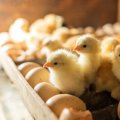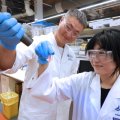The future incidence and impact of fungal diseases on canola crops will be drastically reduced with scientists from The University of Queensland (UQ) helping to crack the genetic code of a close canola relative.
The discovery has major ramifications for Australia’s export trade as the world's second-largest canola exporter and opens the door for Australian breeders to improve crop quality and create disease-resistant varieties.
Dr David Edwards and Dr Jacqueline Batley from UQ’s School of Agriculture and Food Sciences, are part of an international team – the Multinational Brassica Genome Sequencing Project Consortium - that has mapped the genome sequence of the Chinese cabbage (Brassica rapa), which is a vegetable in the same family as canola.
Dr Edwards said unravelling the genetic code was a "big leap forward" because it would now allow scientists to rapidly identify the genes responsible for disease resistance, yield and quality traits.
"Not only have we gained an insight into the evolution of the canola genome, the information will be vital in breeding better canola," Dr Edwards said.
"Canola crops often suffer from fungal disease, so growing canola that has been selected for disease resistance will improve yield and quality for farmers and consumers.”
As part of the international team, UQ’s Dr Jacqueline Batley identified genetic markers for the fungal disease blackleg, which affects canola yield and quality and is highly prevalent in Australia and Canada.
“Blackleg wiped out most of Australia's canola crops in the 1970s and the disease continues to threaten the viability of the Australian canola industry,” Dr Batley said.
"Now we can breed for resistance to it.”
Dr Batley said that by gaining insights into the sequencing of one species, scientists now have a comprehensive roadmap for all genes in brassica crops, including broccoli, turnips, sprouts and cabbages.
“Scientists can now work with breeders and farmers to generate improved crops with greater resistance to diseases,” Dr Batley said.
Progress on genome sequencing for crops like canola and wheat has been slow because of their complicated genomes, but new sequencing and assembly methods have allowed the international team to identify one million genetic markers across the canola genome, after almost 10 years' research.
In 2009, Dr Edwards and Dr Batley participated in a commercially funded Brassica genome sequencing project. Dr Edwards said knowledge UQ gained in that research greatly contributed to the international consortium’s project to sequence the Chinese cabbage.
"Essentially, we are two years ahead because of the prior research," he said.
Australian Oilseeds Federation figures show Australia supplies more than one million tonnes of canola seed annually – 15 to 20 per cent of the global canola trade – to Japan, Europe, China, Pakistan and other international markets.
Canola is Australia's third largest crop, after wheat and barley, and a major source of healthy vegetable oil.
The genome sequencing of the Chinese cabbage (Brassica rapa) was published in the international journal, Nature Genetics, and Dr Edwards will present the results to a national meeting of canola breeders in Melbourne this week.
Media: Dr Dave Edwards, Australian Centre for Plant Functional Genomics, UQ School of Agriculture and Food Sciences (dave.edwards@uq.edu.au, (07) 3346 7084, 0423 826 042) or Dr Jacqueline Batley, UQ School of Agriculture and Food Sciences (j.batley@uq.edu.au, (07) 3346 9534, 0423 841 669)
.jpg)









